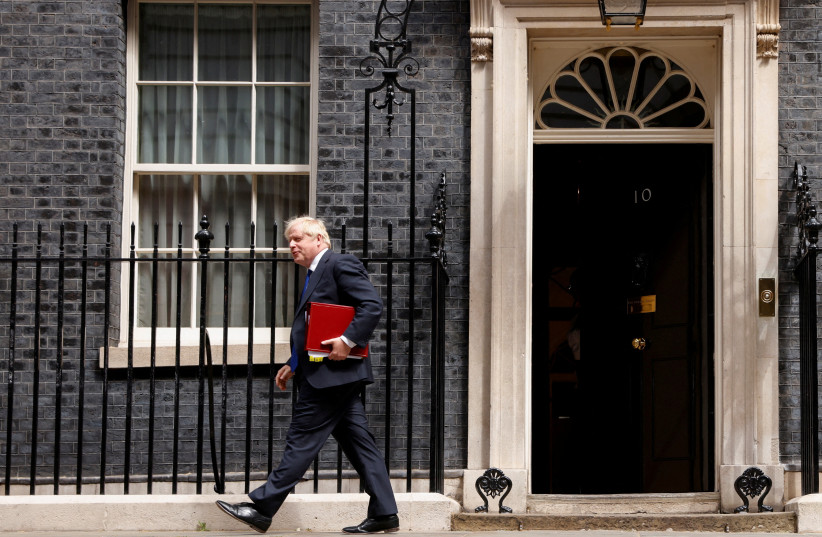The days leading to Boris Johnson’s resignation as leader of the Conservative Party left seasoned British political commentators in shock. Never before has a modern British prime minister tried to cling on so long as his government collapsed around him, defying the growing ranks of cabinet colleagues demanding his departure.
Now we are left to weigh Johnson’s legacy for Britain and consider what will come next.
Johnson was one of those politicians that seemed able to defy political gravity. Acts of dishonesty, indiscretion, misjudgment or incompetence that would be expected to finish a political career seemed to bounce off him.
For Johnson, part of the trick was being entertaining. It has been said that politics is show business for ugly people. As a political performer, he was a true original – perhaps the only politician to intentionally dishevel his appearance before facing a camera. He combined a bumbling persona with an undeniable ability to inspire an audience, especially his party faithful.
He could happily quote Sophocles and Kermit the Frog in the same paragraph, making him seem both worldly and accessible. He could also adopt a Churchillian tone when called for, as he demonstrated in response to the war in Ukraine.

The other critical element of Johnson’s success was fusing his outsized persona with the Brexit cause. Johnson was the most charismatic figure in the Brexit campaign, and his personal promise to “Get Brexit Done” delivered the Conservatives’ smashing victory over Jeremy Corbyn’s Labour in 2019.
Style over substance
But ultimately Johnson epitomized style over substance. He got Brexit done by reneging on his commitments and creating a trade border between Northern Ireland and the rest of the UK, causing political turmoil in Belfast. His government recently started a procedure to unilaterally change this agreement, leaving a crisis with the EU that others will have to resolve.
The scandals that engulfed and ultimately ended his premiership reflected the deep flaws of his personality, all of which were well known from a string of revelations about his conduct before he entered office. The exposure of the heavy drinking and partying culture in 10 Downing Street, at the height of COVID restrictions, and Johnson’s increasingly implausible denials of responsibility, left much of the British public disgusted.
The straw that broke the camel’s back – the revelation that Johnson’s team had falsely claimed the prime minister wasn’t told a minister he promoted had a history of sexual misconduct – was also indicative. For Johnson, it seems, such information was not important enough to take heed or keep track of.
Britain, like Israel, is a parliamentary democracy. The prime minister has no personal mandate. Once their parliamentary party calculates that the leader is more liability than asset they can, and invariably do, get rid of them.
Now the Conservatives will choose a new leader, from a cast of candidates that will all seem somewhat dull in comparison to the man they follow. It is not an uninteresting race, however. For one thing it could produce a prime minister from an ethnic minority background. Bookies’ favorite is youthful former finance minister Rishi Sunak, but it is a wide field and very difficult to predict.
MPs will narrow the selection to two candidates, with 160,000 party members making the final choice. The winner will promptly be invited by the queen to form a government and can stay in No. 10 at least until the 2024 general election.
Whoever wins will be greeted with a groaning in-tray, including acute issues around cost of living and energy as winter approaches. They will also have to define what the Conservatives stand for without the personality of Johnson and the issue of Brexit.
Meanwhile, Labour has an opportunity to recover, after the devastating electoral blow it took under Corbyn. Its leader, Keir Starmer, is the anti-Johnson: decent, competent and in no way entertaining. A former chief public prosecutor, he struggles to crack a smile, much less a joke, before an audience, and has struggled to capture public attention. The Conservatives’ implosion gives him his chance.
But when the next general election comes, Labour could find itself depending on the support of the Scottish National Party to form a government, with the price being another referendum on Scottish independence. The Scots voted to remain in the UK in 2014, but that was before Brexit. Scottish nationalists are now demanding another referendum, apparently fancying their chances.
In sum, the political and constitutional turmoil that the Johnson-orchestrated Brexit decision unleashed, looks set to plague Britain for years to come.
The writer is a lecturer in the Department of Political Studies at Bar-Ilan University. He tweets at @toby_greene_
